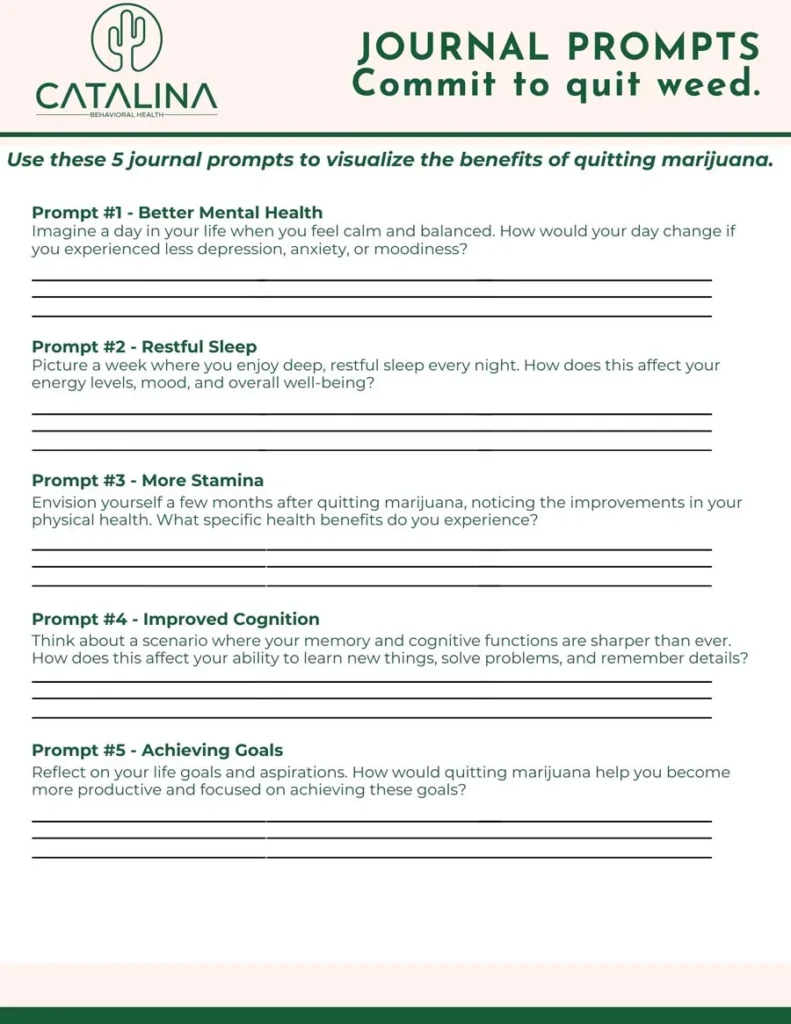Get Motivated to Stop Using Cannabis Today
We get it. We know that quitting marijuana can be challenging. But it helps to hold on to the tangible and proven results that allow you to transition into successful quitting. We think knowing just much how you will prosper without marijuana is a crucial element to success.
So let’s get down to it, and stay with us as we break down the 12 benefits of quitting weed once and for all!
And remember, if you or a loved one need additional support to quit cannabis use, Catalina Behavioral Health can and will help you quit smoking weed and assist you through early withdrawal symptoms.
1. Quitting Marijuana Reduces Depression and Anxiety

Many people turn to smoking marijuana because it helps them cope with stress. At first glance, it calms you down, but it may not have the desired long-term effect. In fact, research points to the opposite reaction: if you quit smoking weed, you will likely have lower levels of both depression and anxiety.
Why does this happen?
According to researchers, prolonged drug abuse actually heightens some of these feelings rather than relieving them. Chronic marijuana users find that their initial stress reduction from the drug is relatively short-lived. Once you can be classified as having cannabis use disorder, you will likely find that the calming effect no longer helps.
Some individuals will have heightened anxiety and depression, but others may even segue into the realm of psychosis, especially those with a pre-existing sensitivity. Your mental health is at stake when it comes to smoking weed, so it is helpful to quit weed as soon as you can to preserve your psychological well-being.
Effective Detox And Rehab Options – Reach Out Now!
2. Better Sleep Patterns Without Marijuana Addiction
Short-term marijuana use is often associated with feelings of relaxation. This serves to improve sleep quality, but the effect does not last long term. According to the same study, quitting marijuana or even taking a ‘t-break’ from THC can lead to a marked improvement in sleep patterns which can have a huge effect on your physical health.
Weed leads to less sleep and poor sleep quality when you do finally lay your head down on the pillow.
During the early days of your marijuana withdrawal symptoms, you may find that sleep is hard to come by if you have been dependent on the drug for a while. However, if you can stick with quitting weed, you will see that you drift off to sleep easier and also remain asleep better.
The result is improved mental clarity, increased energy, and even improved mental health issues. When you start quitting marijuana, many of the benefits are interconnected.
3. Better Respiratory Health When Not Smoking Weed

Imagine what marijuana smoke does to your lungs and respiratory system. Much like cigarettes, you are introducing a new element to your lungs that they were not designed to handle. Before you quit smoking weed, you will likely find that your cannabis consumption leads to poorer respiratory health: a bronchitis-like cough, more sputum, and even wheezing.
The good news is that you can eliminate most of these symptoms simply by quitting weed. One study looked at young adults and measured their respiratory health while smoking weed and then again upon quitting weed. Most symptoms of poor respiratory health and chronic bronchitis resolved upon the elimination of cannabis from their system.
Of course, many people who are actively smoking weed also turn to cigarettes and tobacco products. When you quit marijuana, you should also consider kicking your smoking habit to the curb as well to get the best possible outcome for your lungs. Both tobacco smoke and marijuana smoke are proven harmful to the lungs.
4. Improved Cardiovascular Health
While the withdrawal symptoms after smoking weed can be uncomfortable, it leads to increased health across the board. Namely, your cardiovascular health can improve significantly and put you at less risk of developing serious conditions that could be potentially life-threatening.
One of the risks of smoking marijuana is an increased risk of myocardial infarction. Several studies demonstrate that an otherwise healthy individual will present with chest pain and symptoms of myocardial infarction with the only risk factor being their marijuana dependence.
Smoking marijuana leads to an 8 percent higher risk of this condition. However, that isn’t the only heart problem you might incur if you choose not to quit marijuana. Other cardiovascular system risks include:
- Inflammation in the system as a whole
- Narrower arterial walls (atherosclerosis)
- Cardiac arrhythmias
- Heart failure
If you want to improve both respiratory and cardiovascular health, you would be well advised to consider quitting smoking weed.
5. Increased Testosterone Levels

If you find that you are struggling with hormone levels, it might be worth quitting marijuana to see if it can help naturally. One study found that drug abuse, namely weed, can lead to decreased testosterone levels in male subjects. This drop-off in testosterone levels is present after both smoking weed and intravenous injection of the active ingredient in THC.
Fortunately, this is easily reversed when you decide to start quitting weed. Unlike some withdrawal symptoms that require days or weeks to remedy themselves, testosterone levels are relatively quick to repair. Some males return to their baseline testosterone levels within just 24 hours following the last use of the drug.
What are the effects of having low testosterone long-term? You might be surprised at just how much this symptom of marijuana use can impact your day-to-day life. Low testosterone lowers your sex drive, causes you to gain weight, and saps your energy. In other words, you will feel much healthier and more vibrant with an increased level of testosterone.
Get Immediate Help for Marijuana Abuse – Call Now!
6. Foster Better Brain Development without Marijuana
Many people develop a marijuana use disorder because they think that it can help them relieve some of the uncomfortable symptoms of their mental health. However, it can have some serious long-term effects on brain cells and development for younger users. Especially if you are under the age of 25, you might want to think twice about your recreational marijuana use.
The prefrontal cortex of the brain is still developing well into your mid-twenties. This is the region of the brain that regulates your impulse control and decision-making. Smoking weed makes it less likely that this region will properly develop and could impact you for the rest of your life.
Early marijuana use can even impact social cognition as well as general cognitive function, decreasing your overall quality of life.
7. Ditch Stubborn Weight Gain

Most marijuana smokers know there is another more immediate side effect of using the drug. It is depicted on television and in movies as a quirk of marijuana use: you get the munchies and might eat everything in sight. In particular, you will crave salty, sweet, and generally unhealthy foods.
If you could rein yourself in and consume only healthy foods, it might not be as much of a problem. However, most people turn to junk food or easy fast-food meals. The result is that you likely gain more weight than you otherwise would without a form of marijuana addiction. While you continue to smoke weed, it might be increasingly difficult to shed those pounds.
Once you enter into treatment to kick your marijuana use disorder to the curb, you might find that you are not as hungry as you once were. This can lead you to eat less and result in the desired weight loss that can impact your energy levels and overall physical health and can even benefit your mental health.
8. Improved Memory and Cognitive Function
Have you ever had the experience of forgetting what happened when you smoked marijuana? Maybe you have even had a greenout and lost all memories after consuming too much cannabis.
Both these symptoms and poor working memory can surface with repeated exposure to marijuana as a young adult with a still-developing brain, or even as an adult with heavy use. You may find it takes you more time to remember things and even to complete basic tasks.
While you might experience withdrawal symptoms that are a little uncomfortable at first, this is one area where you can improve quickly. Short-term memory loss can be repaired upon discontinuation of the drug. As long as you continue using the drug, you will find it difficult to learn coping skills and put them into practice.
Addiction recovery comes much easier when you can quit smoking weed altogether. Improved memory can benefit your recovery in many tangible ways and allow you to remember pivotal moments in your life. You will be more present for your friends, family members, and loved ones if you can remember the conversations and events that matter.
This is particularly true for marijuana users who ‘dab’ concentrated forms of the product, as the powerful effects often last much longer than combusted bud being smoked.
9. Increased Productivity and Goal Achievement

When you are smoking marijuana, you likely feel an increased sense of ease and relaxation. This does not lend itself to participating in your day-to-day life and getting things done. The more you smoke, the more you might feel yourself slipping away from the important things in your life.
The result is decreased productivity which makes it challenging for you to achieve your goals, both personal and professional.
Once you make it through the earliest weed withdrawal symptoms, you may find that you have far more motivation to get things done. You will not have the false relaxed feeling that tells you that you have all the time in the world to get things done. Instead, you can start moving full-steam ahead on your goals and dreams.
There is also a chance that you will be more successful professionally upon quitting weed. Some studies show that regular marijuana use contributes to poorer outcomes in the workplace. If you want to advance the corporate ladder and earn a more comfortable living, it might start with marijuana withdrawal.
10. Decrease Impulsive Actions and Risk-Taking
Along with the mood swings or mental health disorders that you are more likely to have when using addictive substances like marijuana, there are other great benefits of quitting weed: primarily you can make better decisions with more forethought and take fewer risks in your life.
When you quit weed, you will be able to think more clearly and can minimize the degree of risk you take day in and day out. The acute symptoms of impulse actions and risk-taking are not always immediately seen, but they are affected long-term if you do not quit weed.
Studies have shown that impulsivity and risk-taking are far more impaired in heavy marijuana users compared to light users and that these effects are residual. More research needs to be done to prove the extent to which impulsivity is impacted upon quitting weed, but there is a greater chance you will be able to repair your decision-making when not under the influence.
11. Fewer Mood Swings = Better Balance in Life

While depression and anxiety are impacted when you stop smoking weed, there is also the likelihood that you will have a more stable mood in general. Research shows that those who smoke weed are more likely to have mental health issues including major depressive disorder or bipolar disorder. In turn, this can worsen symptoms and lead to greater mood swings.
If you are already genetically predisposed to certain conditions such as schizophrenia, not smoking weed has some serious benefits. Substance use disorder can trigger the onset of such illnesses and worsen outcomes. In particular, one of the benefits of quitting weed is that it can reduce suicidal ideation and plans.
Addiction treatment like that offered at Catalina Behavioral Health can help you get to the bottom of mental health issues when you stop smoking weed. We offer support groups as well as one-on-one counseling to help you learn healthier coping mechanisms and decrease your risk of suicide.
Mood swings can strain personal relationships, but seeking professional guidance is a great first step to repair them. We can offer you family therapy when desired, to begin repairing that damage early in the recovery process.
12. Better Digestive Health: Last Among Our Benefits of Quitting Weed
While some doctors will prescribe legalized marijuana for stomach pain, there is also an increased risk of some gastrointestinal disorders that can lead to discomfort. Some of the symptoms of chronic marijuana use include GI issues like GERD, gastric ulcers, and pancreatitis. If you are already at risk for the development of some of these conditions, you should stop substance abuse as soon as possible.
Furthermore, continued substance abuse can negate the effects of medications prescribed to treat these uncomfortable conditions.
The result is that you can be extremely uncomfortable physically in addition to the changes in your cognitive function. Emotional benefits are not the only thing to consider when you stop smoking weed. Your physical health should serve as a crucial motivator to maintain your sobriety for the long haul so that you can be in less pain.
In a final side benefit associated with better health, we have heard several clients report that stopping weed helped acne clear up and skin issues and complexion issues became much less severe.
Get Help for Marijuana Dependence at Catalina Today

Chances are that you know your illegal drug use is problematic for your mental health, physical health, and personal relationships. Catalina Behavioral Health can help you lessen the impact of weed addiction and start to move forward with your personal growth. We have a robust medical community that caters to every aspect of your well-being.
If you are ready to discontinue your cannabis use, allow Catalina Behavioral Health to assist you. Our welcoming admissions staff is ready to bring you into the fold. We can make you more comfortable during the early days of sobriety and help you maintain that sobriety even upon release from our programs.
Reach out to us today to learn more about how we can help you or a loved one find a new life without cannabis use!
We Accept Most Major Insurance Providers – Call Now!
References
- Hser, Y. I., Mooney, L. J., Huang, D., Zhu, Y., Tomko, R. L., McClure, E., Chou, C. P., & Gray, K. M. (2017). Reductions in cannabis use are associated with improvements in anxiety, depression, and sleep quality, but not quality of life. Journal of substance abuse treatment, 81, 53–58.
- Hancox, R. J., Shin, H. H., Gray, A. R., Poulton, R., & Sears, M. R. (2015). Effects of quitting cannabis on respiratory symptoms. The European respiratory journal, 46(1), 80–87.
- Goodwin, R. D., Pacek, L. R., Copeland, J., Moeller, S. J., Dierker, L., Weinberger, A., Gbedemah, M., Zvolensky, M. J., Wall, M. M., & Hasin, D. S. (2018). Trends in Daily Cannabis Use Among Cigarette Smokers: United States, 2002-2014. American journal of public health, 108(1), 137–142.
- Latif, Z., & Garg, N. (2020). The Impact of Marijuana on the Cardiovascular System: A Review of the Most Common Cardiovascular Events Associated with Marijuana Use. Journal of clinical medicine, 9(6), 1925.
- Barnett, G., Chiang, C. W., & Licko, V. (1983). Effects of marijuana on testosterone in male subjects. Journal of theoretical biology, 104(4), 685–692.
- Shollenbarger, S. G., Price, J., Wieser, J., & Lisdahl, K. (2015). Impact of cannabis use on prefrontal and parietal cortex gyrification and surface area in adolescents and emerging adults. Developmental cognitive neuroscience, 16, 46–53.
- Popovici, I., & French, M. T. (2014). Cannabis use, employment, and income: fixed-effects analysis of panel data. The journal of behavioral health services & research, 41(2), 185–202.
- Crean, R. D., Crane, N. A., & Mason, B. J. (2011). An evidence based review of acute and long-term effects of cannabis use on executive cognitive functions. Journal of addiction medicine, 5(1), 1–8.
- Lucatch, A. M., Coles, A. S., Hill, K. P., & George, T. P. (2018). Cannabis and Mood Disorders. Current addiction reports, 5(3), 336–345.
- Han, B., Compton, W. M., Einstein, E. B., & Volkow, N. D. (2021). Associations of Suicidality Trends With Cannabis Use as a Function of Sex and Depression Status. JAMA network open, 4(6), e2113025.
- Adenusi, A. O., Magacha, H. M., Nwaneki, C. M., Asifat, O. A., & Annor, E. N. (2023). Cannabis Use and Associated Gastrointestinal Disorders: A Literature Review. Cureus, 15(7), e41825.





